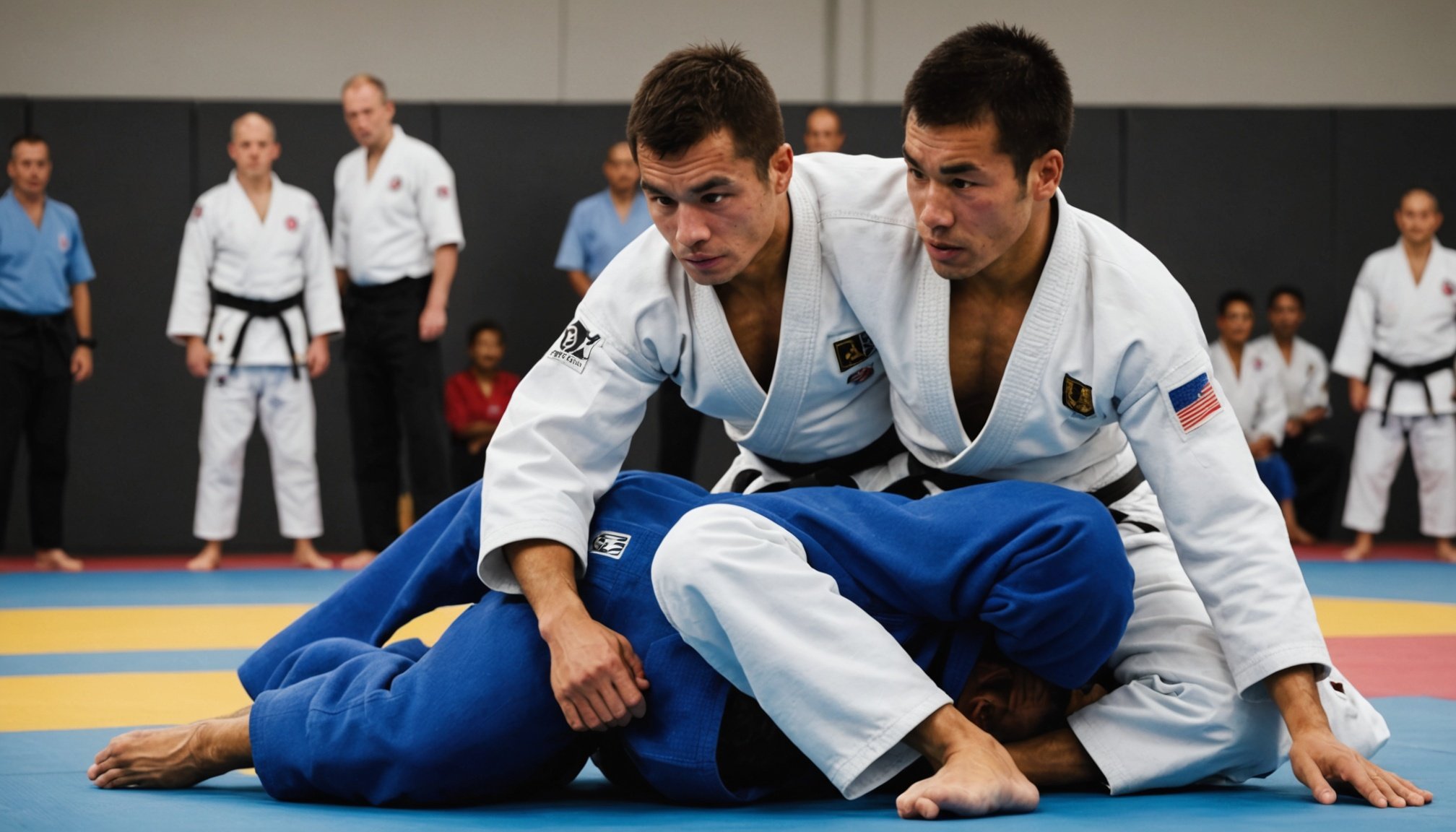Understanding Judo Tactics
In the realm of competitive judo, mastering the right tactics is as essential as physical prowess. Essential judo tactics include learning how to control your opponent’s balance, effective gripping, and timing your attacks—each of these plays a vital role in gaining the upper hand.
Adaptability through match analysis is critical; by closely watching opponents and assessing their strengths and weaknesses, judokas can tailor match strategies to exploit vulnerabilities. This analytical approach should be complemented by mental preparation. Visualization techniques, for instance, can enhance tactical thinking by enabling athletes to mentally rehearse scenarios, increasing their readiness and confidence when facing challenging situations.
Topic to read : Boost your fencing lunge: transform uk athletes” performance with dynamic plyometric training techniques
Mental preparation, often overlooked, is integral to success on the tatami. Engaging in visualization and rehearsing potential match scenarios within the mind can lead to a deeper understanding of one’s moves and strategies, enhancing performance significantly. Such preparation extends beyond mere tactical planning; it involves anticipating reactions and staying mentally resilient.
To encapsulate, a sophisticated synthesis of physical technique, strategic adaptability, and psychological readiness constitutes the backbone of effective judo tactics. By honing these skills, competitors can enhance their competitive judo outcomes. Understanding and implementing these elements can serve to improve any judoka’s competitive edge dramatically.
In the same genre : Achieving equity in the ring: effective tactics for uk combat sports referees to deliver precise judgments
Effective Training Regimens
Establishing a well-rounded training plan is crucial for judo enthusiasts intent on honing their skills. Judo training prioritizes not just technical acumen but also physical conditioning. Key exercises include developing flexibility, vital for executing graceful throws and withstanding opponent maneuvers. Daily stretching routines focusing on the hips, shoulders, and legs can significantly enhance performance.
Furthermore, the role of strength cannot be overstated, as powerful grips and robust body mechanics are essential during matches. Judo athletes often incorporate weight training and resistance exercises to build strength. Core routines can include bench presses, squats, and deadlifts, which support the judoka’s ability to maintain balance and control.
Cardiovascular fitness is another pillar, ensuring endurance over multiple bouts. Typical cardio exercises like running, cycling, or swimming are integrated into the weekly training schedule to bolster stamina.
An effective judo training plan spans across the week with targeted sessions. For instance, balancing technical practice with conditioning highlights an athlete’s adaptability. Rest days, equally critical, allow body recovery and mental rejuvenation. By tailoring a week-long schedule, judokas can optimize preparation and ultimately, their competitive edge. Adhering to such structure fosters holistic development, critical for anyone serious about excelling in judo.
Drills for Skill Enhancement
Enhancing your judo skills involves embracing a variety of judo drills tailored for specific areas. Focused practice on throws, groundwork, and transitions can elevate your skill enhancement. For instance, repetitions of classic throws like O-soto-gari or Uchi-mata can improve technique precision. Groundwork drills, such as guard passes, develop agility and control over opponents.
Practice techniques can be advanced by incorporating both partner and solo drills. Partner drills facilitate real-time tactical adaptations, mirroring competitive scenarios. Practising alone, however, allows emphasis on repetitive movements, honing individual technique. Balance them to maximize competitive judo readiness.
Moreover, incorporating game-like scenarios into your sessions encourages dynamic problem-solving, reinforcing technique application in rapidly changing situations. Simulated matches can cultivate adaptability and strategic development, mimicking real competition pressures. This method encourages judokas to think on their feet, refining both offensive and defensive match strategies.
In summary, a blend of targeted judo drills and scenarios integrated into training empowers judokas to fine-tune their skills effectively, preparing them for the multifaceted nature of judo competitions. By strategically varying practice techniques, judokas can confidently approach any competitive judo encounter with enhanced skill and strategy.
Expert Insights and Interviews
Connecting with judo experts and delving into their insights can be transformative for enhancing your judo practice. Interviews with seasoned coaches reveal that developing robust match preparation techniques is crucial for success in competitive judo. They emphasize the importance of discipline, strategic planning, and resilience, which are cultivated over years of practice and competition.
Top judo athletes share invaluable experiences and highlight the training methods that contribute to their achievements. They often underline the balance between physical conditioning and mental readiness, asserting that a sound mind significantly complements a strong body. Many describe how they’ve refined their training plans to focus not only on technical skills but also on adaptability during high-pressure matches.
Learning from the challenges that leading athletes face provides a profound understanding of the rigours of competitive judo. Obstacles such as injuries and setbacks are common, yet they form pivotal components of a judoka’s journey. Coaches and athletes alike stress that perseverance and a proactive approach in addressing these challenges foster personal growth and, ultimately, advancement in the sport. Such insights serve as an inspiration and guide for judokas aiming to excel in their craft.
Case Studies from UK Competitions
Examining insightful case studies from recent UK judo tournaments reveals how tactical adaptations can make a significant difference in competition outcomes. In one notable match, an athlete managed to turn a defensive position into an offensive maneuver by astutely altering grip positions, a masterstroke in strategic adaptability. This example highlights the essence of learning how to effectively execute tactical adaptations during matches.
Key factors often leading to success include the judoka’s ability to analyse real-time match dynamics and adjust their pre-planned strategies. This on-the-spot adaptability is markedly evident in many UK judo competitions, where competitors continually reassess their opponents’ weaknesses and modify their tactics accordingly.
Despite the triumphs, there are success stories and unavoidable setbacks. These experiences offer valuable lessons for competitive judo enthusiasts. For instance, one case study described an athlete encountering consecutive losses due to an unaddressed mental block and lack of variance in technical approach. Post-match analysis and guided adjustments in training eventually led to improved performance.
Such case studies provide rich insights, underscoring the importance of match case studies and their role in enhancing judo tactical adaptations to turn challenges into stepping stones for success.
Resources and Additional Support
Exploring a range of judo resources can significantly aid both newcomers and experienced practitioners. Recommended materials, such as books and instructional videos, provide valuable insights into training support and skill enhancement. Online platforms offer courses that delve into technique improvements, match analysis, and mental preparation strategies, which are crucial for those looking to deepen their understanding of the sport.
Finding Local Clubs and Training Partners
For practical engagement, discovering local clubs is essential. Many UK judo clubs welcome new members and offer a community for sports enthusiasts to improve and exchange knowledge. Potential practitioners should search for registrations with the British Judo Association to ensure quality and proper coaching standards, aiming to create an enriching environment.
Mental Health Resources
Balanced mental well-being is pivotal for competitive athletes. Judo, being a high-pressure combat sport, can benefit from mental health resources. Many organizations provide support and counseling specifically tailored for combat sports participants. The inclusion of psychological health services is crucial, helping athletes manage anxiety and build resilience.
Leveraging such educational materials and supportive venues can significantly enhance the overall journey of judo practitioners, providing them with comprehensive development tools and environments to thrive in the combative landscape.











